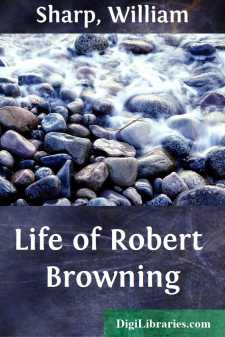Categories
- Antiques & Collectibles 13
- Architecture 36
- Art 48
- Bibles 22
- Biography & Autobiography 813
- Body, Mind & Spirit 142
- Business & Economics 28
- Children's Books 14
- Children's Fiction 11
- Computers 4
- Cooking 94
- Crafts & Hobbies 4
- Drama 346
- Education 46
- Family & Relationships 57
- Fiction 11828
- Games 19
- Gardening 17
- Health & Fitness 34
- History 1377
- House & Home 1
- Humor 147
- Juvenile Fiction 1873
- Juvenile Nonfiction 202
- Language Arts & Disciplines 88
- Law 16
- Literary Collections 686
- Literary Criticism 179
- Mathematics 13
- Medical 41
- Music 40
- Nature 179
- Non-Classifiable 1768
- Performing Arts 7
- Periodicals 1453
- Philosophy 64
- Photography 2
- Poetry 896
- Political Science 203
- Psychology 42
- Reference 154
- Religion 513
- Science 126
- Self-Help 84
- Social Science 81
- Sports & Recreation 34
- Study Aids 3
- Technology & Engineering 59
- Transportation 23
- Travel 463
- True Crime 29
Life of Robert Browning
by: William Sharp
Categories:
Description:
Excerpt
CHAPTER I.
It must, to admirers of Browning's writings, appear singularly appropriate that so cosmopolitan a poet was born in London. It would seem as though something of that mighty complex life, so confusedly petty to the narrow vision, so grandiose and even majestic to the larger ken, had blent with his being from the first. What fitter birthplace for the poet whom a comrade has called the "Subtlest Assertor of the Soul in Song," the poet whose writings are indeed a mirror of the age?
A man may be in all things a Londoner and yet be a provincial. The accident of birthplace does not necessarily involve parochialism of the soul. It is not the village which produces the Hampden, but the Hampden who immortalises the village. It is a favourite jest of Rusticus that his urban brother has the manner of Omniscience and the knowledge of a parish beadle. Nevertheless, though the strongest blood insurgent in the metropolitan heart is not that which is native to it, one might well be proud to have had one's atom-pulse atune from the first with the large rhythm of the national life at its turbulent, congested, but ever ebullient centre. Certainly Browning was not the man to be ashamed of his being a Londoner, much less to deny his natal place. He was proud of it: through good sense, no doubt, but possibly also through some instinctive apprehension of the fact that the great city was indeed the fit mother of such a son. "Ashamed of having been born in the greatest city of the world!" he exclaimed on one occasion; "what an extraordinary thing to say! It suggests a wavelet in a muddy shallow grimily contorting itself because it had its birth out in the great ocean."
On the day of the poet's funeral in Westminster Abbey, one of the most eminent of his peers remarked to me that Browning came to us as one coming into his own. This is profoundly true. There was in good sooth a mansion prepared against his advent. Long ago, we should have surrendered as to a conqueror: now, however, we know that princes of the mind, though they must be valorous and potent as of yore, can enter upon no heritance save that which naturally awaits them, and has been made theirs by long and intricate processes.
The lustrum which saw the birth of Robert Browning, that is the third in the nineteenth century, was a remarkable one indeed. Thackeray came into the world some months earlier than the great poet, Charles Dickens within the same twelvemonth, and Tennyson three years sooner, when also Elizabeth Barrett was born, and the foremost naturalist of modern times first saw the light. It is a matter of significance that the great wave of scientific thought which ultimately bore forward on its crest so many famous men, from Brewster and Faraday to Charles Darwin, had just begun to rise with irresistible impulsion. Lepsius's birth was in 1813, and that of the great Flemish novelist, Henri Conscience, in 1812: about the same period were the births of Freiligrath, Gutzkow, and Auerbach, respectively one of the most lyrical poets, the most potent dramatist, the most charming romancer of Germany: and, also, in France, of Théophile Gautier and Alfred de Musset....


